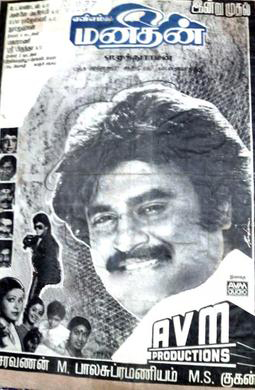Type a search term to find related articles by LIMS subject matter experts gathered from the most trusted and dynamic collaboration tools in the laboratory informatics industry.
| Manithan | |
|---|---|
 Theatrical release poster | |
| Directed by | S. P. Muthuraman |
| Screenplay by | Panchu Arunachalam |
| Story by | V. C. Guhanathan |
| Produced by | M. Saravanan M. Balasubramaniam |
| Starring | Rajinikanth Rupini Raghuvaran |
| Cinematography | T. S. Vinayagam |
| Edited by | R. Vittal S. B. Mohan |
| Music by | Chandrabose |
Production company | |
Release date |
|
| Country | India |
| Language | Tamil |
| Box office | ₹7.5 Crore |
Manithan (transl. Human) is a 1987 Indian Tamil-language masala film[1] directed by S. P. Muthuraman, starring Rajinikanth, Rupini and Raghuvaran, with Senthil, Delhi Ganesh and Srividya. It was released on 21 October 1987, and became a silver jubilee industry hit.
The story revolves around Raja, who grows up in juvenile detention due to hitting his teacher by a table weight for falsely calling him a thief due to the only reason he was born on a No Moon Day. He was born to a superstitious father who believes that a person born on a No Moon Day will surely turn criminal. When his imprisonment years are over, he joins the People Welfare Organisation in a local community and helps the needy people. In due course, he gets enemies due to his good deeds. The rest of the story forms on how Raja succeeds over his enemies and disproves the false claims on him and the superstitions and prejudice that surrounded him.
V. C. Guhanathan developed a story named Amavasayil Pirandha Oruvanin Kadhai (transl. The story of a man born on Amavasya) which Panchu Arunachalam expanded into a screenplay.[2] With Rajinikanth cast in the lead role, AVM titled the film Manithan (transl. Human) as they felt Rajinikanth was a fantastic human. Distributors objected to the title as there was previously a play of the same name staged by TKS Brothers, but AVM refused to change the title of their film.[3] Rupini accepted to star in Manithan after another film she was doing, Sir I Love You, was shelved.[4]
The music was composed by Chandrabose. Lyrics for this film were written by Vairamuthu.[5][6] The title song was not originally intended to be added in the film as the film did not have right situation for this song to be placed; however Rajinikanth who was impressed with this song wanted to have this song in the film so it was picturised and placed in title credits.[7][8][9]
| Song | Singers | Length |
|---|---|---|
| "Kaalai Kaalai" | S. P. Balasubrahmanyam and S. P. Sailaja | 04:23 |
| "Manithan Manithan" | Malaysia Vasudevan | 04:24 |
| "Muthu Muthu Pennai" | Vani Jairam | 04:19 |
| "Vanaththai Parthen" | S. P. Balasubrahmanyam | 04:32 |
| "Vanaththai Parthen" (Sad) | S. P. Balasubrahmanyam, Vanitha and Kovai Murali | 05:20 |
| "Yedho Nadakkirathu" | K. J. Yesudas and K. S. Chithra | 04:44 |
Manithan was released 21 October 1987, Diwali day. Despite facing competition from Nayakan, released on the same day, Tamil version became more successful,[10][11] and a silver jubilee industry hit.[12] N. Krishnaswamy of The Indian Express wrote, "It is a no-holds-barred commercial film, but the formula works."[13] Jayamanmadhan of Kalki, however, reviewed the film more negatively for being too formulaic.[1] The film's silver jubilee function was held at Rajeshwari Marriage Hall in late April 1988.[a] Chandrabose won the award for Best Music Director at the 8th Cinema Express Awards.[16]
Manithan was screened alongside other films of Rajinikanth like Murattu Kaalai, Pokkiri Raja, Paayum Puli at Albert theatre, on the occasion of his birthday on 12 December 2012.[17] The film's title inspired that of a 2016 film.[18]